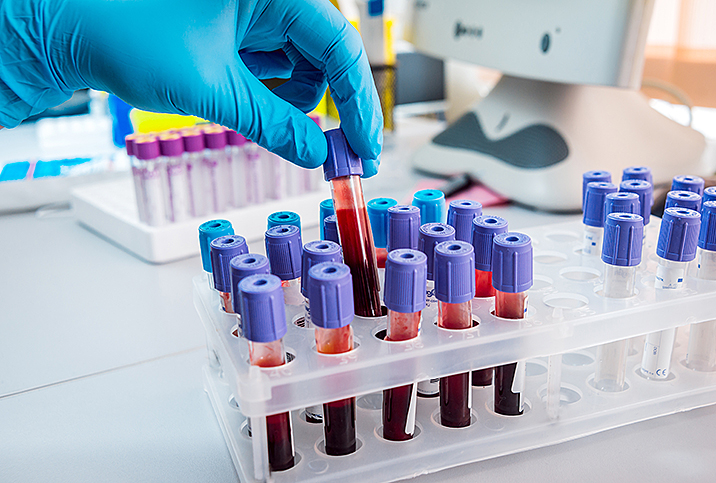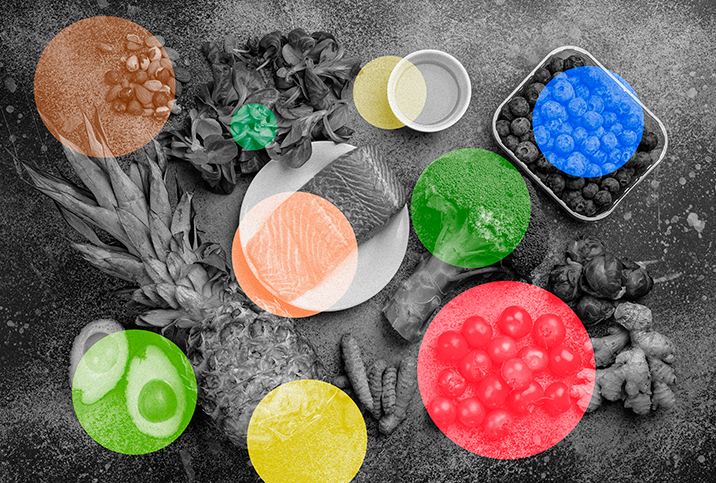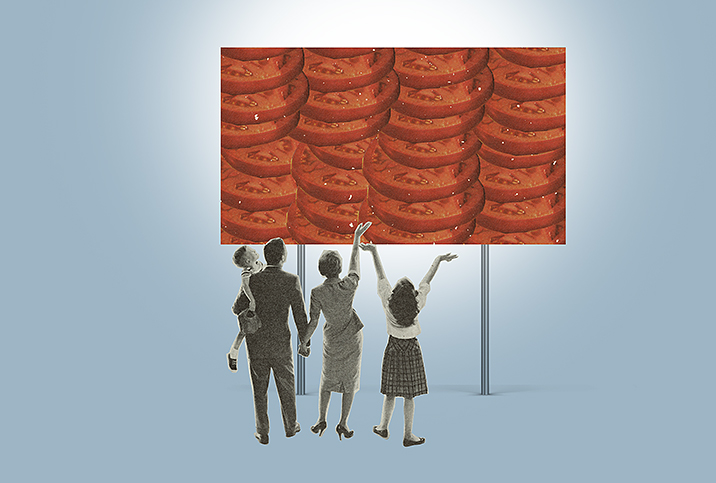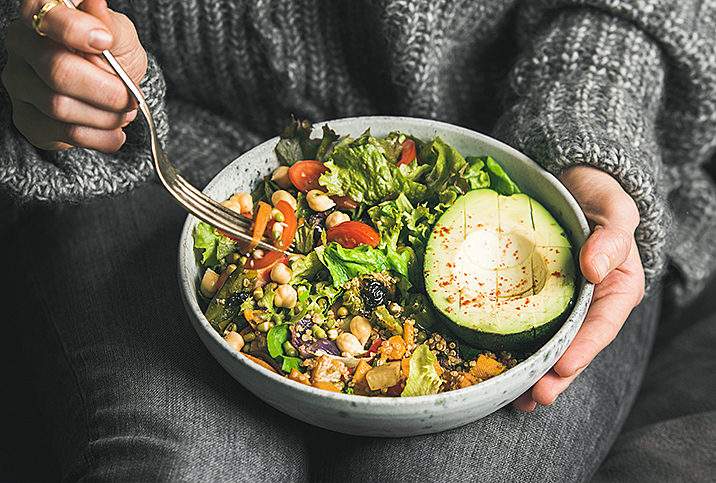Start a Food Fight With Inflammation

When your body detects a threat, such as an infection or injury, the immune system—responsible for warding off harmful stimuli and aiding your body in recovery so it can return to homeostasis—reacts with an inflammatory response. Inflammation can be caused by a number of variables, but has just as many methods of treatment.
Before trying prescriptions, though, you may want to take a look at your diet and modify it to better combat inflammatory responses. Even for people who require medical attention for inflammation—such as patients with autoimmune conditions—anti-inflammatory dietary modifications are a great supporting treatment.
The roots of inflammation
Everyone experiences inflammation in some way, shape or form.
"Inflammation is your body's response to stress, injury and infection," said Melissa Ann Prest, a licensed dietitian nutritionist who works as a spokesperson for the Academy of Nutrition and Dietetics and as a dietitian at the National Kidney Foundation of Illinois.
A wound, sickness or agitation cues a response that sends specialized cells to the affected area. These cells then work in overdrive to terminate threats—whether real or perceived.
"The body releases inflammatory cells and cytokines," explained Mascha Davis, a registered dietitian nutritionist based in Los Angeles and the author of "Eat Your Vitamins." "In the acute state, inflammation is a good thing as it can help your body heal."
However, she went on to assert the risks of chronic inflammation, which she defined as your body continuing to steadily release these cells even when danger is no longer present.
"This low-level chronic inflammation affects your entire body and can lead to diseases like cardiovascular disease, Alzheimer's disease, certain types of cancer, type 2 diabetes, stroke and many autoimmune diseases," said Krista Gast, a registered dietitian in Grand Rapids, Michigan, with more than 20 years of experience.
Davis, Gast and Prest all agreed on the following risk factors for chronic inflammation:
- Excessive smoking and/or drinking
- Chronic stress
- Poor diet
- Too little or too much exercise
- Autoimmune disorders/conditions
- Environmental toxins, such as pollution or chemicals in food or water
Though there is no end-all and be-all solution for inflammation, the diet you choose has consistently been shown to make a positive impact. However, Gast mentioned that while diet plays a major role in resolving inflammation, other factors such as sleep, movement and stress management take priority, as well.
Food vs. inflammation
"The saying 'You are what you eat' isn't so far from the truth," Davis said. "Certain foods provide anti-inflammatory compounds and help your body fight against oxidative stress."
It is these antioxidants that are crucial to any anti-inflammatory diet.
"Nutrient-poor foods make up the core of the Standard American Diet (SAD), which is heavy in fast food, fried foods, sugar-sweetened and artificially sweetened beverages, and many packaged, ultra-processed foods," Gast said.
The Standard American Diet describes what Americans typically eat, as defined by the U.S. Department of Agriculture based on input from nutritional experts and national surveys. Gast noted that the SAD centers around animal protein, dairy and refined carbohydrates, which can lead to a deficiency in both fiber and phytonutrients—which are essential for controlling chronic inflammation.
"It is also important to think about how we prepare foods," Prest explained. "If we roast or grill chicken instead of poaching, we increase the number of advanced glycation end-products (AGEs), which promote inflammation and can lead to cell damage and premature aging."
To limit the formation of AGEs, Prest recommended using water and acid in the cooking process. This isn't to say you should cut out all oil from your diet. Rather, use anti-inflammatory substitutes for everyday products—in this case, extra virgin olive oil or macadamia oil are perfect replacements.
What to eat
Davis, Gast and Prest recommended increasing consumption of:
- Nuts and seeds, such as almonds, cashews, hazelnuts, pine nuts, pistachios, pumpkin seeds, sesame seeds, sunflower seeds and walnuts
- Foods rich in omega-3 fats, such as fatty fish (halibut, salmon, sardines) and soy products (tofu, tempeh)
- Legumes, such as chickpeas, lentils, pinto beans and edamame
- Whole grains, such as barley, brown rice, oats, whole rye and whole wheat
- Fruit, such as apples, apricots, bananas, berries, dates, grapes, grapefruit, lemons, melons, peaches, pears and pineapples
- Cruciferous vegetables and greens, such as arugula, broccoli, cabbage, cauliflower, chard and spinach
- Non-starchy vegetables, such as asparagus, carrots, celery, eggplant, mushrooms, onions and tomatoes
- Starchy vegetables, such as potatoes and sweet potatoes, both with their skin
- Dark chocolate, especially if it consists of 70 percent or more of cacao solids
- Coffee, tea (black and green) and water
Certain herbs and spices, particularly turmeric, black pepper, cayenne, ginger, cinnamon and cloves, also fight inflammation and can be added to various foods.
What to avoid
The Standard American Diet is a recipe for inflammation because it's too rich in saturated and trans fats, ultra-processed and refined foods, sodium and sugar. Steer clear of the heavy hitters below, but note that you may need to play detective in the store and read ingredient lists.
- Fried food (Air frying is healthier than regular frying, but oven-baking is best)
- Food that contains added sugar and/or salt
- Refined carbohydrates, such as bread containing white flour, breakfast cereals, white rice and pizza
- Trans and saturated fats, such as those found in commercial bakery products, doughnuts and nondairy coffee creamer
- Certain oils, namely canola oil, corn oil, sunflower oil and soy oil
- Processed meats, such as bacon, burgers and sausages
- Artificial additives and preservatives, the chemicals added to food during the manufacturing process
It may take time to learn appropriate food choices to ward off inflammation, but don't give up. Once you learn what's safe to eat and appropriately size your portions, it will become second nature.
Mediterranean and plant-based diets
All three experts recommended the Mediterranean diet to fight inflammation.
"A key recommendation is to consume more seafood, which will help to increase omega-3 intake," Davis said. "Mediterranean diets also emphasize healthy fats like avocados, nuts and seeds over unsaturated fats like butter and lard, and include a variety of anti-inflammatory high-fiber fruits and veggies."
Plant-based diets, such as vegetarian and vegan, notably reduce inflammation, too. The unhealthy fats, hormones and high glycemic indexes found in animal products—particularly in red and processed meat—represent well-known triggers for inflammation.
"All these diets focus on filling your plate with fruits, vegetables, plant-based proteins and swapping saturated fats with unsaturated fats," Prest said.
'Make more room for plant foods on your plate or in your bowl and less room for the ultra-processed foods and beverages.'
The lack of omega-6 fats and abundance of antioxidants and fiber found in plant-based and particularly vegan diets are practically tailored to be anti-inflammatory.
Gast and Prest emphasized food ratios, as well, and both suggested eating predominantly vegetables.
"Make more room for plant foods on your plate or in your bowl and less room for the ultra-processed foods and beverages," Gast said.
"Instead of focusing on large portions of animal-based proteins and low-fiber starches, make vegetables the biggest portion on the plate, followed by fruit, high-fiber grains and starches, and finish with a palm-of-the-hand portion of protein," Priest advised. "Try to build in a few meatless meals a week."
The takeaway
"Tackling inflammation requires a holistic approach where we focus on health from all areas, including food intake, movement and mental well-being," Davis said. "Focus on adding anti-inflammatory foods and high-quality supplements to fill any gaps. And aim for at least 150 minutes of exercise each week and add in stress management tools."
Food can be a powerful tool against inflammation. Your choices every day could make a world of difference with the frequency and severity of inflammatory flare-ups.


















